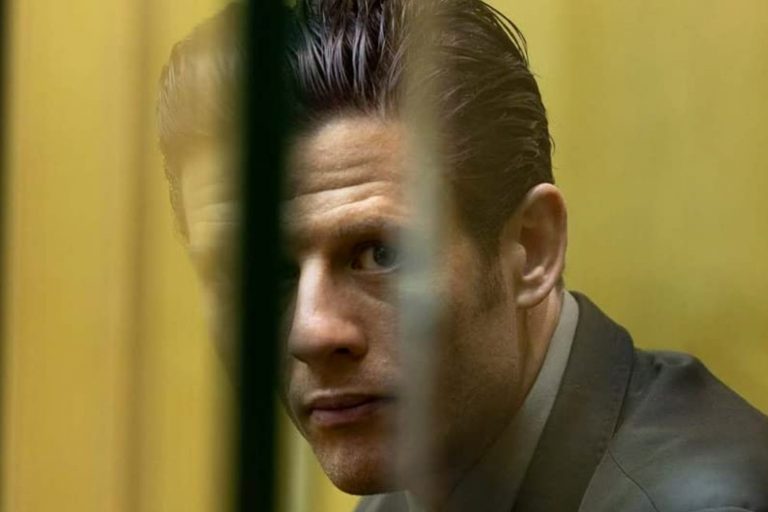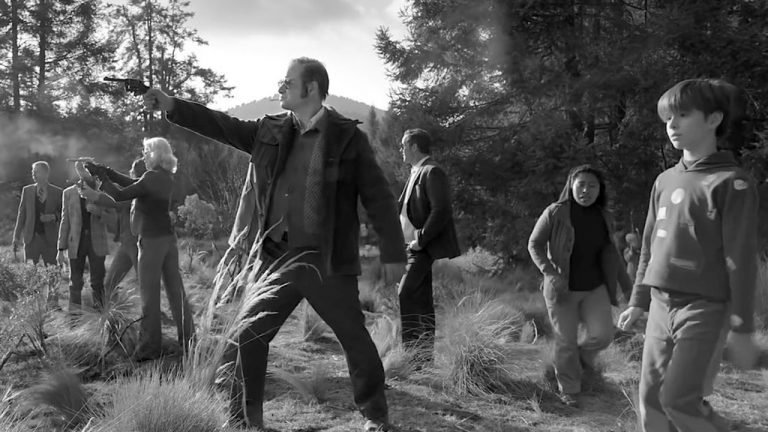Pathos can be a significant driving force for dramatic storytelling; if you’re going to feel invested in someone’s troubles, it only makes sense to cultivate a sense of anguish for the audience to latch onto. Outside of fictional storytelling, some people live off the pathos they invoke from others in their daily lives as a means of defense against the harshness of the world around them. But at what point does pathos creep into self-pity, and to that end, at what point do people get too annoyed to care anymore?
Aaron Schimberg’s cold black comedy “A Different Man” doesn’t go about answering this question in particular—its protagonist’s sense of insecurity isn’t used as a means of prodding those around him beyond the point of acceptance—but in his examination of volatile self-esteem and the comforts we find in our own skin, Schimberg can’t help but zero in on the questions of likeability that surround those of us who’ve developed our own comforts in feeling sorry for ourselves.
That isn’t, naturally, to say that Edward (Sebastian Stan) is a man who inherently feels sorry for himself, but the world he traverses can’t help but enforce this feeling of outcastedness no matter how hard it tries to make him feel welcome. A man suffering from neurofibromatosis (a heavy facial disfigurement), the brunt of Edward’s insecurities tend to arise in moments when people think they’re being nice—or, at the very least, discreet.
Not one to dwell on Oscar-baity degrees of self-congratulation, Schimberg frames Edward’s social woes in subtle but never missable ways; people steal glances at him on the subway, his neighbor can’t help but mutter “Jesus” under his breath every time they cross paths, and his biggest break as an actor so far has been starring in an office tutorial video about being mindful of colleagues with distracting physical disabilities. Trepidatious as he is to step up in life (even to complain to his landlord about his leaky ceiling), Edward does step forward when an experimental drug trial offers the potential to cure his condition entirely.
Lo and behold, the drug treatment is a success, and Sebastian Stan’s Edward eventually begins to look like… Sebastian Stan! Content with this new lease on life, Edward takes the opportunity to kill off the name with the physique, adopting the moniker “Guy” and telling his doctors—and, by proxy, his mostly friendly neighbor Ingrid (Renate Reinsve)—that Edward is no more. Guy’s new life, led by this move into traditional attractiveness, begins to crack as he reunites with Ingrid under this new name, putting him in the path of Oswald (Adam Pearson), another man with neurofibromatosis, but swaggering through life a blissful confidence that drug treatment just can’t buy.
At this point, “A Different Man” moves beyond the physical and into the psychological, as Edward’s reactions to Oswald’s mere existence put him in a position of complete befuddlement. Edward’s insecurity may have derived from the world’s reaction to his condition. Still, Oswald is proof that such physical ailment is not necessarily what defines your impression of those around you. More than a mere “beauty is in the eye of the beholder” moralizing tale, Schimberg’s darker touch plays this hand with a more nuanced understanding of how people perceive one another, particularly by diving into their most quiet, often-inadvertent despicable acts.
Ingrid clearly cared for Edward to the point where, as an aspiring playwright, she found inspiration in his pitiful (and, as far as she knew, finished) life story. However, doesn’t the very act of putting on this show reek, at least somewhat, of exploitation? When explaining her mindset to “Guy,” Ingrid struggles to find the word for what she’s doing; Guy suggests “tribute,” but she offers “amalgamation.” This more or less encapsulates the extent of her interest in Edward’s life, but as we identify with his sense of self-pity, Schimberg still has us asking: does she even owe him anything at all?
Unassuming in its hidden complexities, “A Different Man” never beats you over the head with a streamlined sense of identification because Schimberg is wise to show how everyone in this story exhibits varying degrees of scumminess. Edward, in his new skin, is still entirely lacking in the confidence needed for a true sense of self-fulfillment—a reality of which Oswald’s overbearing friendliness is quick and constant to remind him—but there’s only so much sympathy we can drum up for a man whose sense of isolation will manifest in the ways it does as the narrative progresses.

Edward is never the “bad guy,” though; neither is Ingrid or Oswald. There is, instead, a sense of inevitable ebb and flow to their dynamic that evolves as their internal grasps with the situation—this play, meant as an internal examination of a man none of them, even Edward, seem to actually have known—come to points of natural friction. Under the guise of Schimberg’s frigidly humorous hand (this sharp sense of social awkwardness and evolving comedic psychology puts him in a similar field as “Dream Scenario” architect Kristoffer Borgli), “A Different Man” carries its thematic highwire act through the grace of its trio of lead performances.
Having won the Best Lead Performance award at this year’s Berlinale, Stan’s corporeal presence exists beyond the makeup, allowing for consistency in his body language to believably sell not only Edward’s transition but also the lingering gloom buried in his posture and hand-wringing. For his part, Pearson (who suffers from neurofibromatosis in real life) is a crucial foil to Edward’s mentality in his ability to fully sell that essential self-assurance. Reinsve, returning to her Worst Person in the World well, once again finds a pocket of likeability in a woman whose occasionally parasitic and often inconsiderate behavior may make the prospect of such affability a challenge, allowing the ease with which she handles it all to be the more impressive.
“We have no control of the flight mechanism in that reptilian part of our brains,” A Different Man’s office PSA states; Aaron Schimberg knows this and, consequently, knows that if we do decide to stick around, we may find ourselves just as uncomfortable with what we don’t see in the mirror.




![A Gaza Weekend [2022] ‘TIFF’ review: A Massively Entertaining Tale of a Couple Helplessly Searching for Safety](https://79468c92.delivery.rocketcdn.me/wp-content/uploads/2022/09/Gaza-Weekend-2022-768x384.jpg)

![The Road Movie [2018]: Anarchy on the Roads of Hell](https://79468c92.delivery.rocketcdn.me/wp-content/uploads/2018/01/ROAD_MOVIE_2018_HOF-768x432.jpg)
![Don’t Look Up [2021] Review – Adam McKay Delivers A Strong Pre-apocalyptic Movie Filled With Solid Performances](https://79468c92.delivery.rocketcdn.me/wp-content/uploads/2021/12/Dont-Look-Up-1-768x512.jpg)
